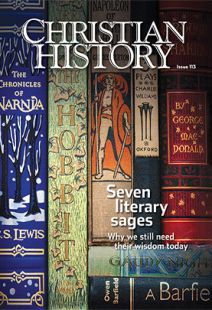So great a cloud of witnesses
GEORGE MACDONALD (1824-1905)
— CHESTERTON read MACDONALD at a young age and said he counted him as one of the three or four greatest literary men of the nineteenth century. He served as chairman of events at MACDONALD’s 100th birthday celebration in 1924.
— LEWIS recommended MACDONALD’s Unspoken Sermons to a number of correspondents and said MACDONALD was “consistently closer to the Spirit of Christ” than anyone else he knew of. He used him as a guide character in his Great Divorce. Reading MACDONALD’s Phantastes was highly influential in LEWIS’s conversion.
— WILLIAMS included one of MACDONALD’s poems in an anthology for Oxford University Press.
— BARFIELD praised MACDONALD’s writing, and TOLKIEN enjoyed his stories.
G.K. CHESTERTON (1874-1936)
— LEWIS read CHESTERTON’s The Everlasting Man and some of his essays on his road to conversion; he said that MACDONALD baptized his imagination while CHESTERTON baptized his intellect. He quoted or referred to him in several later letters and books.
— SAYERS and CHESTERTON helped found the Detection Club in 1929, a group of mystery writers of which CHESTERTON was the first president. She once wrote: “G. K.’s books have become more a part of my mental make-up than those of any writer you could name.”
— CHESTERTON wrote to WILLIAMS in 1935 of his admiration for WILLIAMS’s poetry.
CHARLES WILLIAMS (1886-1945)
— LEWIS invited WILLIAMS to a meeting of the Inklings (see p. 25) in 1936 after reading his The Place of the Lion. WILLIAMS met regularly with the group, which included TOLKIEN and BARFIELD, from the time of his relocation to Oxford in 1939 until his death.
— Members of the Inklings, especially LEWIS and TOLKIEN, promoted WILLIAMS‘s works and speaking skills to their colleagues and friends. LEWIS’s That Hideous Strength is, among other things, an homage to WILLIAMS‘s writings.
— SAYERS was inspired to translate Dante by reading WILLIAMS and later wrote the famous essay “Dante and Charles WILLIAMS.” WILLIAMS reviewed her novel The Nine Tailors with great praise.
J.R.R. TOLKIEN (1892-1973)
— TOLKIEN became friends with LEWIS at Oxford in 1926. A long conversation on Addison’s Walk in 1931 with TOLKIEN and Hugo Dyson was crucial in LEWIS’s conversion to Christianity. In 1936 the two made a pact to write books on space travel (LEWIS) and time travel (TOLKIEN) that resulted in LEWIS writing his Space Trilogy. TOLKIEN never finished his book, The Lost Road.
— TOLKIEN joined the Inklings, who began meeting in 1929. He interacted regularly with LEWIS—and, in later years, with WILLIAMSand BARFIELD.
— TOLKIEN read SAYERS’s mysteries, although he did not care for the later ones.
— TOLKIEN and LEWIS arranged for WILLIAMS to give lectures at Oxford and to obtain an honorary Oxford M.A. (which made WILLIAMS eligible for election to the Oxford Dante Society). TOLKIEN contributed to Essays Presented to Charles Williams, published after WILLIAMS’s death.
DOROTHY L. SAYERS (1893-1957)
— CHESTERTON influenced SAYERS’s spiritual life and writing. In fact she attributed her decision to fully embrace Christianity to his books.
— SAYERS corresponded with both LEWIS and WILLIAMS and joined LEWIS sometimes at meetings of the Oxford Socratic Club. WILLIAMS’s positive review of The Nine Tailors began their friendship. His request that she be given the commission to write The Zeal of Thy House for the 1937 Canterbury Festival helped redirect her into playwriting and into exploring themes of creativity and work. Reading his The Figure of Beatrice influenced her to translate Dante.
— SAYERS did not meet with the all-male Inklings.
— SAYERS contributed along with TOLKIEN, LEWIS, and BARFIELD to Essays Presented to Charles Williams.
C.S. LEWIS(1898-1963)
— Writings of MACDONALD and CHESTERTON and friendships with TOLKIEN and BARFIELD were all instrumental in LEWIS’s conversion. He was a member of the Inklings. LEWIS became friends with WILLIAMS in 1936 after reading his The Place of the Lion, and he steadfastly promoted WILLIAMS’s writings. LEWIS encouraged TOLKIEN to finish The Lord of the Rings and wrote enthusiastic reviews of both The Hobbit and LOTR.
— BARFIELD was one of LEWIS’s favorite conversation partners and also served as his solicitor. They were friends from 1919 until LEWIS’s death.
— LEWIS corresponded with SAYERS and offered critiques (solicited) on her works. He read her play cycle, The Man Born to Be King, every year in Holy Week for decades and wrote a eulogy for her memorial service.
— LEWIS contributed to Essays Presented to Charles Williams.
OWEN BARFIELD (1898-1997)
— BARFIELD met with the Inklings, although infrequently since he practiced law in London after 1929.
—BARFIELD influenced the thought of both LEWIS and TOLKIEN, giving LEWIS an abiding respect for the past and changing the way TOLKIEN understood and taught the history of language (for more see “The forgotten Inkling,” pp. 46–49).
— LEWIS was godfather to BARFIELD’s daughter, Lucy, and dedicated The Lion, the Witch, and the Wardrobe to her and The Voyage of the Dawn Treader to BARFIELD’s foster son, Jeffrey. Lucy Pevensie may be based on Lucy BARFIELD. BARFIELD’s writings on his friend have been collected into Owen BARFIELD on C. S. LEWIS.
— BARFIELD contributed along with TOLKIEN, SAYERS, and LEWIS to Essays Presented to Charles Williams.
By By Jennifer Woodruff Tait and Marjorie Lamp Mead
[Christian History originally published this article in Christian History Issue #113 in 2015]
Jennifer Woodruff Tait is managing editor of Christian History and Marjorie Lamp Mead works with the Wade Center.Next articles
Seven sages: recommended resources
With seven influential authors and scores of books by and about them, where should one begin? Here are suggestions compiled by our editors, contributors, and the Wade Center
the editorsFrancis Asbury, Did you know?
Without Francis Asbury, the American landscape would look very different
the editorsEditor's note: Francis Asbury
Methodism’s beginning in America was many things I had not expected
Jennifer Woodruff Tait



